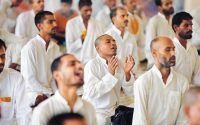$100 Website Offer
Get your personal website + domain for just $100.
Limited Time Offer!
Claim Your Website NowRohingyas to be deported today as Supreme Court refuses to stop Modi govt

Source-dnaindia.com
The Supreme Court on Thursday refused to entertain the fresh plea challenging the decision of the Centre to deport seven Rohingya immigrants, who have been staying in Assam illegally, to their home country Myanmar.
The Rohingya immigrants will be handed over to the Myanmar authorities in Moreh border post in Manipur on Thursday.
Earlier on Wednesday, a fresh plea was moved in the Supreme Court seeking to restrain the Centre from deporting to Myanmar the seven Rohingyas lodged in a detention centre at Silchar in Assam.
A bench, headed by Chief Justice Ranjan Gogoi, which made it clear to lawyers at the outset that it will not allow urgent mentioning of matters till the framing of “parameters” on such cases, said that it would take a decision on urgent hearing in this issue after perusing the application.
The bench, also comprising Justices S K Kaul and K M Joseph, was told by lawyer Prashant Bhushan that some Rohingya refugees were on the verge of being deported and the matter required urgent hearing.’
“No mentioning. We will work out the parameters then we will see as to how mentioning will be done,” the bench said, adding that matters like execution of a death row convict, eviction cases can be heard urgently.
Initially, the bench asked Bhushan to file the plea and on being told that the application has already been filed, it said, “We will peruse the file and the decide”.’
The interim plea, seeking urgent measures to stop the proposed deportation of seven Rohingyas, was filed in a pending PIL.
The PIL was filed earlier by two Rohingya immigrants — Mohammad Salimullah and Mohammad Shaqir — challenging the Centre’s decision to deport over 40,000 refugees who came to India after escaping from Myanmar due to widespread discrimination and violence against the community.
The fresh plea said that the decision to deport was in “grave violation” of India’s international obligation and moreover, the situation in Myanmar was extremely dangerous for the Rohingyas to return and they are likely to be subjected to torture and even killed.
“Pass an order restraining the Union of India from taking any steps towards the deportation of any Rohingya refugees lodged in jails or detention centres in Assam or other parts of the country in contravention of non-derogable principles of customary international law and during the pendency if the case,” the plea said.
Issue direction to officials of prison at Silchar Central jail in Assam and Union Home Ministry to “allow and facilitate the detenues in question as a well as other detenues on other prisons in Assam to approach the UNHCR in New Delhi to determine/ascertain if they are in need of international protection as refugees within its mandate and for grant of refugee identification cards,” it said.
The plea also referred to alarm raised by United Nations Human Rights expert over the proposed deportation of seven Rohingya to Myanmar, saying their forcible return could constitute “refoulement” which was violative of international law.
Earlier, the apex court had appointed area Sub-Divisional Magistrates (SDMs) as nodal officers who could be approached by the Rohingya immigrants living at Kalindi Kunj in Delhi and Mewat in Haryana with grievances relating to health care, water, sanitation and education.
The bench was hearing petitions including the two filed by Zaffar Ullah and two Rohingyas — Mohammad Salimullah and Mohammad Shaqir.
While one plea challenged the Centre’s decision to deport over 40,000 refugees who came to India, the other has sought several human and civic rights for the immigrants.
The Rohingyas, who fled to India after violence in the Western Rakhine State of Myanmar, are settled in Jammu, Hyderabad, Haryana, Uttar Pradesh, Delhi-NCR and Rajasthan.
More than 650,000 Rohingya Muslims fled Rakhine in August 2017 after Myanmar’s army launched a massive crackdown in its northern state, retaliating the attacks by insurgents, Arakan Rohingya Salvation Army on the country’s police posts and a military base.
A large number of Rohingya refugees, since then, have taken shelter in India and Bangladesh, and are staying in refugee camps, often raising security concerns.
In June, the Home Ministry wrote a letter to the Jammu and Kashmir government, saying, “Such illegal migrations poses serious challenges and has security implications since some of the migrants have been found to have indulged in illegal activities and are vulnerable to radicalisation.”



